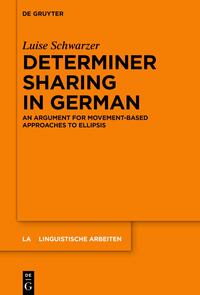
This monograph presents the first in-depth empirical and theoretical study of determiner sharing in German, addressing both its language-specific properties and its comparative syntax. Determiner sharing poses an interesting problem for syntactic theory as it seemingly relies on a parasitic relationship with another form of ellipsis, such as gapping. The first part provides an empirical basis by presenting three acceptability judgment studies for German. The results reveal the novel generalization that determiner sharing is not uniquely dependent on gapping, but can also occur in stripping contexts. The analysis that is developed in the second part shows that the apparent parasitism of determiner sharing can be derived by combining two independently available processes, namely a type of ellipsis like gapping, and a type of movement like split topicalization. The analysis thus avoids any construction-specific additions to the syntactic framework. The findings constitute an argument for approaches to ellipsis that posit an obligatory movement step and thereby contribute to an ongoing debate in the field.